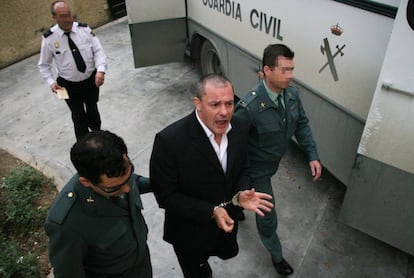Life in Spain’s closed prison regime: 21 hours a day alone in a cell
British national Tony King, convicted of murdering two teens, is one of several inmates being kept in maximum security conditions


The public controversy over a congressional proposal to repeal permanent reviewable prison has not reached the closed-regime units at Spanish penitentiaries. This is where inmates convicted of terrorism, or of mafia affiliation, or of committing “especially violent crimes against life and sexual freedom,” or those prisoners considered “extremely dangerous,” are kept in solitary confinement.
Inmates spend 21 hours a day inside an individual, eight-square-meter cell, Monday through Sunday, from January to December, year after year. They have breakfast, lunch and dinner behind bars. Every day they are frisked and their possessions are searched. The few hours that they are allowed out in the courtyard, they are almost always alone and under surveillance. They have very limited contact with other inmates or prison workers.
King, a British national, was convicted for the murders of teenage girls Rocío Wanninkhof and Sonia Carabantes in the Costa del Sol
In 2016, there were 193 prisoners in these circumstances, according to the latest annual Torture Prevention Report by the Ombudsman’s Office. This study defined the living conditions of closed regime inmates as “harsh.”
One of those 193 prisoners is Tony Alexander King, a British national who was convicted for the murders of Rocío Wanninkhof and Sonia Carabantes in the Costa del Sol. King, who has been in prison since September 2003, was found guilty of the murder of both teenage girls, one in 1999 and the other in 2003. He was also convicted of attempted rape in a third case involving a young woman in Málaga province.
From day one he was classified as a first-degree prisoner – reportedly to protect him from other inmates who might want to harm him due to the nature of his crimes – and he has remained in this situation ever since.
In these 14-and-a-half years King has only left the penitentiary once, under police custody. It was in September 2007, to attend his own daughter’s funeral after the latter drowned in a swimming pool. He has not been granted any other leaves, and it is not likely that he will be before he serves his entire term. By then, in late August 2033, he will be 68 years old.

In all this time, King has spent time inside isolation units at three Spanish penitentiaries. Following his arrest, he was taken to the correctional facility at Alhaurín de la Torre (Málaga), the one nearest the courts investigating both murders.
In July 2004 he was transferred to Albolote (Granada), and four years later to Herrera de La Mancha (Ciudad Real), a maximum-security prison that also held a significant number of ETA convicts until the Spanish government began a policy of scattering terrorists in prisons throughout the territory. In the nearly 10 years that he has been in Ciudad Real, King has always remained inside the isolation block, which contains around a dozen individual cells (although very few of them are currently occupied).
However, two of these inmates are familiar to Spaniards. One is Santiago del Valle, a sexual offender who murdered five-year-old Mari Luz Cortés in January 2008. The child’s father, Juan José Cortés, has since headed efforts by relatives of murder victims who do not want a repeal of reviewable permanent prison.
The second inmate is Juvenilson Días da Silva, known as the “Pozuelo Rapist,” who was handed more than 300 years in prison for sexually abusing 19 women between August 2000 and July 2003. All three are classified as Category 5 for very serious sexual assaults that caused “great social alarm.” Even though they share a facility, they hardly ever seen one another inside the courtyard, and any relations among the three are confined to conversations they may have from cell to cell.
King has only left the penitentiary once, under police custody, to attend his daughter’s funeral
At Herrera de La Mancha, King and the other two first-degree inmates live under Article 93 of the Penitentiary Regulations, in place since 1996. These regulations state that inmates will get “at least three hours a day in the courtyard,” a period that may be extended a further three hours “for programmed activities.”
In the case of the British murderer, this measure is applied in its most restrictive form, prison sources admitted. King occasionally refuses to go outdoors, particularly on cold or rainy days, and spends that time instead in a room where he works on puzzles. He is not allowed into the canteen to buy food or personal-hygiene products; instead, he makes a list and another inmate is charged with the purchases. “His attitude toward the prison workers is good, and in the 10 years he has been at Herrera de La Mancha there have been no disciplinary proceedings against him,” said prison sources.
In spite of this, his chances of improving his regime are low, said the same sources. Although King’s situation must legally undergo review every three months, judicial sources at Instituciones Penitenciarias, the national prisons authority, said that in some cases the closed regime becomes chronic, even though on paper the ultimate goal is “the progressive adaptation of the inmate to life in an ordinary regime.”
In some cases, solitary confinement is maintained throughout the entire duration of the sentence, as was the case with a few ETA terrorism convicts. At other times, it is the judges in charge of penitentiary surveillance who must order authorities to transfer appealing inmates to a less stringent regime with more outdoor time and more contact with other prisoners.
The Interior Ministry declined to comment on King’s penitentiary situation.
In its latest report for torture prevention a year ago, the Ombudsman criticized the fact that isolation cells had very little furniture and that the windows “often face the lightwell wall.”
“Courtyards are normally made of cement, with no vegetation or elements for practicing sports, and without covered areas to take refuge from the weather,” added the report. The study also noted that prisoners received “scant therapeutic or rehabilitating attention” and that an August 2016 order had just made conditions for closed regime prisoners even tougher.
The report concluded that solitary confinement should be an exceptional measure and be applied “the minimum necessary time.” King has been in a closed regime for nearly 15 years, half of his total sentence.
English version by Susana Urra.
Tu suscripción se está usando en otro dispositivo
¿Quieres añadir otro usuario a tu suscripción?
Si continúas leyendo en este dispositivo, no se podrá leer en el otro.
FlechaTu suscripción se está usando en otro dispositivo y solo puedes acceder a EL PAÍS desde un dispositivo a la vez.
Si quieres compartir tu cuenta, cambia tu suscripción a la modalidad Premium, así podrás añadir otro usuario. Cada uno accederá con su propia cuenta de email, lo que os permitirá personalizar vuestra experiencia en EL PAÍS.
¿Tienes una suscripción de empresa? Accede aquí para contratar más cuentas.
En el caso de no saber quién está usando tu cuenta, te recomendamos cambiar tu contraseña aquí.
Si decides continuar compartiendo tu cuenta, este mensaje se mostrará en tu dispositivo y en el de la otra persona que está usando tu cuenta de forma indefinida, afectando a tu experiencia de lectura. Puedes consultar aquí los términos y condiciones de la suscripción digital.








































